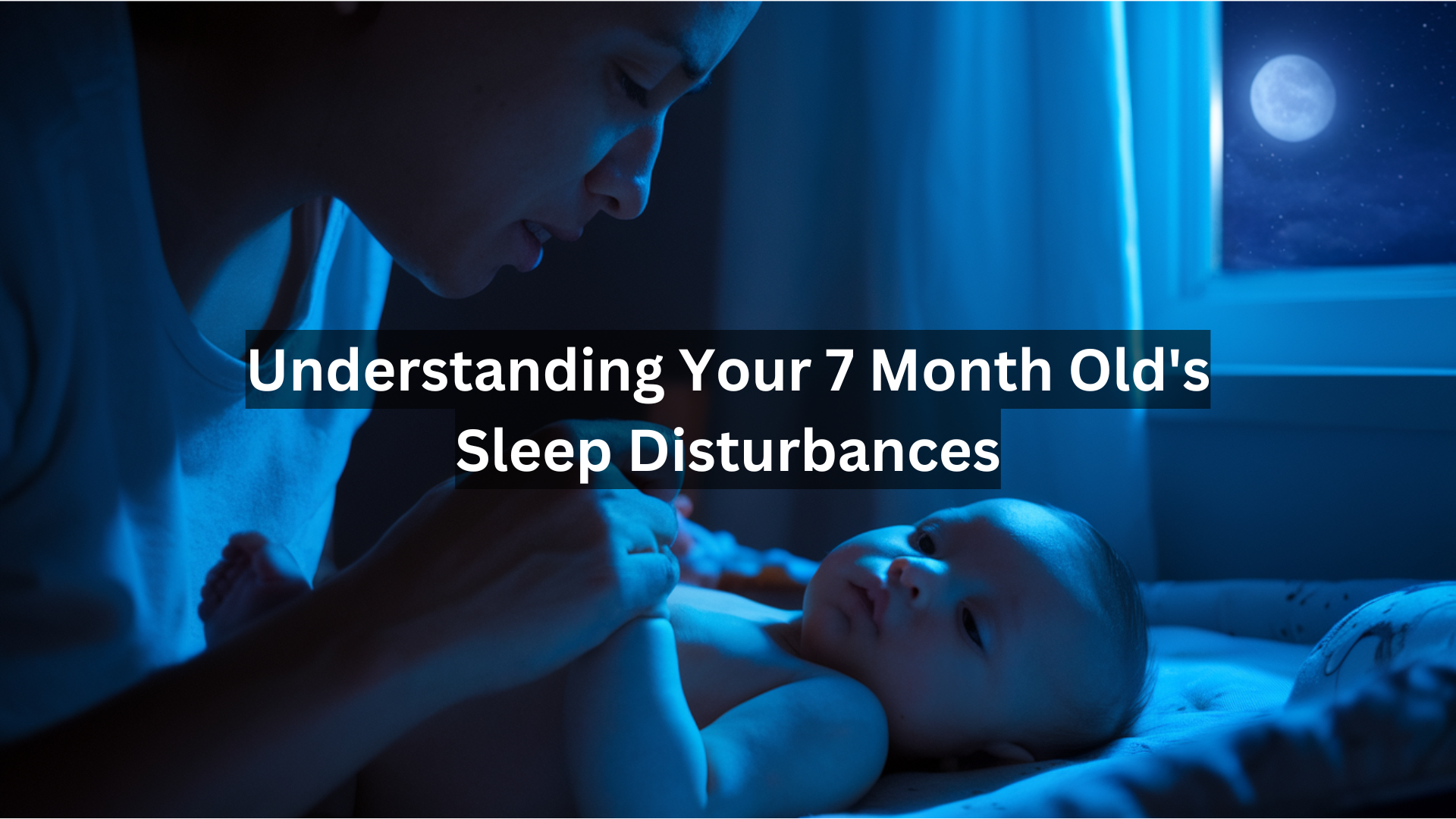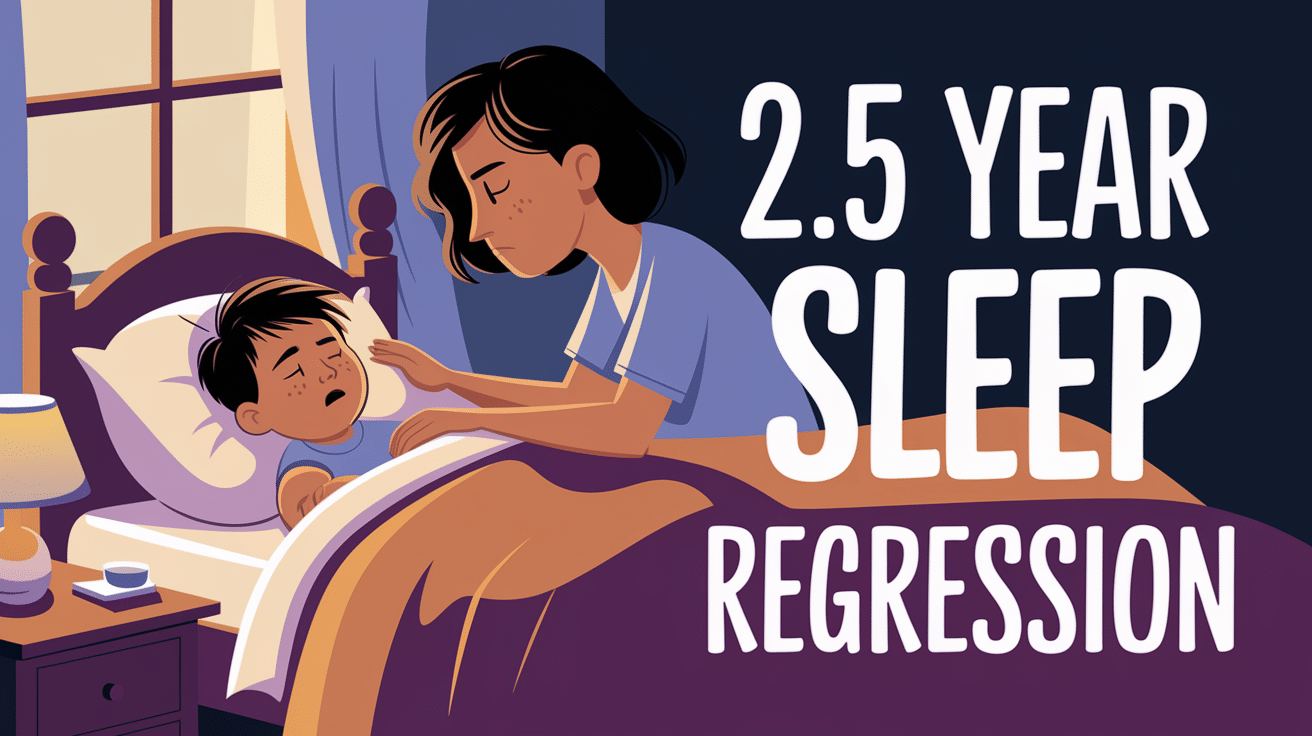
Is your sleep broken into tiny bits because your baby wakes up constantly? You’re not alone.
Many parents face this same struggle with their 10-month-olds. Night waking at this age is common but feels overwhelming when you’re the one losing sleep night after night.
This tough phase leaves many parents tired, confused, and wondering what changed in their once-decent sleeper. The good news? This won’t last forever.
In this article, I’ll cover:
- The main reasons your 10-month-old might wake hourly
- Practical steps to help your baby sleep longer stretches
- How to adjust your approach based on your parenting style
As parents who’ve been through this stage ourselves, we know what works. My advice comes from real experience and child sleep research, giving you tools to help both you and your baby get the rest you need.
Understanding Your 10-Month-Old’s Sleep Patterns
Most 10-month-olds need about 12-14 hours of sleep daily.
This usually breaks down into 10-12 hours at night and 2-3 hours during daytime naps. When I work with tired parents, I often find their expectations don’t match what’s normal for this age.
A typical day for babies this age might look like:
- Morning nap: 1-1.5 hours (usually 2-3 hours after waking)
- Afternoon nap: 1-1.5 hours (about 3 hours after the first nap ends)
- Bedtime: Between 6:30-8:00 PM
At 10 months, your little one is working on big skills like pulling up, cruising along furniture, or maybe even taking first steps. These physical leaps affect sleep in ways you might not expect.
Your baby’s brain keeps working on these skills at night. This mental activity can wake them up between sleep cycles—sometimes every hour.
Other changes happening now:
- Growing awareness that you exist even when out of sight
- More complex thinking and memory
- Stronger attachment to you
Each of these developments can turn a good sleeper into one who wakes frequently. Your baby isn’t being difficult on purpose—their brain is just incredibly busy right now.
Understanding these patterns helps you set realistic expectations. This knowledge doesn’t magically fix the hourly wake-ups, but it helps explain why they happen.
Common Reasons Your 10-Month-Old Might Be Waking Up

When your baby wakes every hour at night, you might feel like you’re the only parent facing this challenge. You’re not. Many babies go through phases of frequent night-waking, and there’s usually a reason behind it.
I’ve found that most sleep troubles at this age stem from several possible causes working together. Let’s look at what might be happening with your little one:
1. Teething
Those little teeth pushing through can cause real pain. Your baby might sleep fine until the throbbing sensation becomes too much to ignore.
Teething pain often gets worse at night when there are fewer distractions. Your baby might wake suddenly crying or fussing and find it hard to settle back down without comfort. The discomfort isn’t in their head—it’s real.
Some signs of teething that affect sleep:
- Excessive drooling during the day
- Flushed cheeks or face
- Chewing on everything they can grab
- Refusing to eat solid foods they normally enjoy
2. Growth Spurts
Your 10-month-old is growing fast! During growth spurts, their body needs more fuel, which can disrupt sleep patterns.
Growth spurts often happen around 10 months. Your baby might seem hungrier than usual and wake up looking for extra feeds. Their body is working overtime, even during sleep, which can cause restlessness and more frequent wake-ups.
What you might notice during a growth spurt:
- Increased appetite during the day
- Wanting to nurse or bottle feed more often
- Clothes suddenly seeming tighter
- More fussiness without a clear reason
3. Daytime Hunger
If your baby doesn’t eat enough during waking hours, they might try to make up for it at night.
I’ve seen this pattern many times—babies who are distracted during daytime feeds or who are eager to explore often don’t take in enough calories. Then nighttime hunger kicks in. Their tummies are small and need regular filling.
Signs your baby might need more daytime nutrition:
- Short, distracted feeds during the day
- High interest in solid foods but not consuming much
- Seeming satisfied with very small portions
- Waking hungry and desperate to eat at night
4. Separation Anxiety
This is a big one at 10 months! Your baby now understands you exist even when they can’t see you.
Separation anxiety peaks around this age. Your baby forms strong attachments and gets upset when you’re not there. Waking up to find you gone can trigger crying and difficulty going back to sleep without your presence.
How separation anxiety shows up at night:
- Baby seems fine until they realize you’re not there
- Calms quickly when you return to the room
- May cry before fully awake
- Might reach for you desperately when upset
5. Sleep Timing Issues
Being overtired or not tired enough can both cause sleep problems.
Finding the right bedtime is tricky. If your baby goes to bed too early, they might not be tired enough to stay asleep.
Too late, they become overtired, making it harder to fall and stay asleep. The timing sweet spot changes as your baby grows.
Clues your baby’s sleep timing needs adjustment:
- Takes more than 30 minutes to fall asleep at bedtime
- Wakes up extremely early in the morning
- Shows signs of being tired long before bedtime
- Second wind of energy right when you try to put them down
Tips to Help Your Baby Sleep Longer Stretches

Let’s talk about practical steps you can take tonight to help your baby sleep better. I’ve used these methods with hundreds of families, and they often make a real difference. Small changes can lead to big improvements in sleep.
These tips won’t work magic overnight, but consistent use can help your 10-month-old connect sleep cycles and stay asleep longer.
1. Create a Bedtime Routine
A steady, calm routine before bed helps your baby understand that sleep time is coming. When they recognize the pattern, their brain starts to release sleep hormones.
Your routine doesn’t need to be long or complex – aim for 20-30 minutes of quiet, soothing activities. Start with a warm bath, then move to a dimly lit room for a story or lullaby.
End with a feeding in a quiet place. Repeat these steps in the same order at about the same time each night. Your baby will begin to expect what comes next and prepare for sleep.
2. Adjust Nap Timing
The way your baby naps during the day directly affects how they sleeps at night. Finding the right balance is key.
Watch your baby’s sleep cues and adjust nap times based on how they respond. Most 10-month-olds do well with naps ending by 4:00 or 4:30 PM.
Too much daytime sleep can lead to night problems, but too little leaves them overtired. Track when your baby seems most tired and build your nap schedule around these natural sleepy windows.
3. Add Comfort Items
Many babies sleep better with something familiar and comforting nearby. These items help them feel secure when they wake between sleep cycles.
Introduce a small stuffed animal, special blanket, or soft toy that stays in the crib. Let your baby play with this item when they’re happy and awake so they form positive connections to it.
Make sure any comfort object meets safety guidelines—nothing with small parts or long strings. These special items can help your baby self-soothe when it stirs at night.
4. Use White Noise
Steady background sounds can help block household noises and remind babies of the comforting sounds they heard in the womb.
Try a white noise machine, fan, or app that plays continuous, gentle sounds. Place it away from the crib but close enough to mask outside noises.
Many babies respond well to “shushing” sounds or heartbeat rhythms. The consistent sound helps them fall back asleep when they wake between sleep cycles without needing your help.
5. Check Room Conditions
The physical space where your baby sleeps affects how well and how long they stay asleep. Small adjustments can make a big difference.
Keep the room cool – between 68-72°F works best for most babies. Make sure it’s dark enough by using blackout curtains, especially for early morning wakings.
Check for scratchy pajama tags, lumpy mattresses, or other physical discomforts. Remove any blinking lights or electronics that might disturb their sleep.
When to Talk to Your Pediatrician?
While most sleep issues at 10 months are normal phases, sometimes there’s more to the story. I always tell parents to trust their instincts. You know your baby better than anyone else.
Most sleep troubles resolve with time and consistent treatment. However, certain signs suggest you should check with your child’s doctor.
1. Physical Symptoms
Your baby’s sleep problems might have medical causes that need attention. If waking up hourly comes with unusual symptoms, don’t wait to call the doctor.
Contact your pediatrician if your baby shows signs like fever, unusual rashes, or breathing changes, along with sleep troubles.
These could point to ear infections, which often hurt more when babies lie down. Acid reflux can also frequently wake babies, as stomach acid irritates their throats when they’re flat on their backs.
2. Changes in Behavior
Sometimes, your baby’s behavior when awake tells you something might be wrong. Major shifts in how they eat, play, or interact deserve medical attention.
If your normally happy baby seems constantly cranky, refuses to eat, or shows no interest in play, something might be causing discomfort.
Sleep problems that come with big personality changes often have underlying causes worth checking. Your doctor can help determine if there’s a hidden issue affecting both daytime behavior and nighttime sleep.
3. Extreme Reactions
The intensity of your baby’s night-wakings can offer clues about potential problems needing medical care.
When your baby wakes screaming inconsolably rather than just fussing, or seems genuinely afraid or in pain, call your doctor.
Night terrors can begin around this age and cause dramatic wakings. Intense pain that won’t ease with your usual comfort measures might indicate ear infections or other issues that need treatment.
4. Sleep Apnea Signs
Disrupted breathing during sleep is serious and requires immediate medical attention.
If you notice your baby snores loudly, gasps, chokes, or has long pauses in breathing while asleep, contact your doctor. Babies with sleep apnea often wake frequently throughout the night.
They might sweat excessively during sleep or sleep in unusual positions trying to keep their irways open. These signs always warrant a conversation with your pediatrician.
Sleep Training for 10 Months: Is It Time?
When your baby keeps waking every hour, you might wonder if sleep training could help. This is a personal choice, and there is no single right answer. I believe the best approach matches your parenting style and your baby’s temperament.
Sleep training means helping your baby learn to fall asleep independently. Many babies are ready for this skill at 10 months.
1. Know Your Options
Sleep training isn’t one-size-fits-all. Methods range from very gentle approaches to more structured ones with less parent involvement.
Gentle methods include the chair method, where you sit by the crib and slowly move farther away each night. More structured approaches involve brief check-ins or allowing your baby to learn self-soothing with minimal intervention.
2. Check for Readiness Signs
Not every 10-month-old is ready for sleep training. Look for signs that your baby has the developmental ability to learn this skill.
Watch for self-soothing attempts like thumb sucking or cuddling with a lovey. Notice if your baby sometimes falls asleep without help or can occasionally return to sleep without assistance when they wake.
3. Consider Your Comfort Level
The best sleep training method is one you can consistently follow. Your comfort matters as much as what experts recommend.
If crying makes you extremely anxious, choose a more gradual approach, even if it takes longer. If you function poorly with severe sleep deprivation, a quicker method might better serve your family’s needs.
4. Start With Bedtime
Most sleep experts recommend beginning sleep training at bedtime when your baby’s drive to sleep is strongest.
Focus first on helping your baby fall asleep independently at the start of the night. Once they master this skill, they’ll often use it when they wake during the night too.
5. Be Consistent
Whatever method you choose, consistency helps your baby learn what to expect and adapt more quickly to the new routine.
Stick with your chosen approach for at least 7-10 days before deciding if it’s working. Mixed messages confuse babies and make the process harder for everyone involved.
Staying Sane Through Sleep Struggles: Parent Survival Tips

While you work on improving your baby’s sleep, remember about your own well-being. Your needs matter, too. I’ve seen many parents push themselves to the breaking point during these tough sleep phases.
Sleep deprivation makes everything harder. These strategies can help you cope with your baby’s sleep challenges.
1. Share The Load
If you have a partner, create a system where both of you get some uninterrupted sleep during this difficult phase.
Consider taking shifts – one person handles bedtime until midnight, then the other takes over until morning. Or alternate nights entirely. Even one four-hour stretch of solid sleep can make a huge difference in how you function the next day.
2. Rest When Possible
The old advice to “sleep when the baby sleeps” isn’t always practical, but finding moments of rest matters.
If napping when your baby naps doesn’t work for you, try just lying down with your eyes closed. Even brief periods of quiet rest help your body recover from sleep loss and reduce stress levels.
3. Lower Your Standards
During intense sleep disruption phases, something has to give. Now is not the time for perfectionism in other areas of life.
Let the dishes sit in the sink sometimes. Order takeout when cooking feels overwhelming. Wear the same comfy clothes two days in a row. Focus your limited energy on essential tasks and caring for your baby and yourself.
4. Ask For Specific Help
Many people want to help but don’t know how. Tell them exactly what would make your life easier during this tough time.
Request a home-cooked meal, an hour to shower and nap, or help with household chores. Most friends and family feel good about providing concrete assistance when you’re struggling with a non-sleeping baby.
5. Find Your Community
Connecting with other parents facing similar challenges reminds you that you’re not alone in this struggle.
Join online groups specifically for parents of babies with sleep issues. Knowing others are awake at 3 AM too provides comfort and practical tips from those who truly understand what you’re going through.
Conclusion
Sleep challenges at 10 months are normal but exhausting. I’ve seen countless families go through this phase and come out the other side.
Your baby is growing in amazing ways right now, with its brain and body changing daily. These changes affect sleep, but they won’t last forever.
What helps most?
- Consistency with your approach
- Patience with your baby and yourself
- Small steps toward better sleep habits
- Taking care of your own needs, too
Trust your instincts. You know your baby best. If a sleep method doesn’t feel right, it’s okay to try something else.
Your baby will sleep through the night eventually. In the meantime, be gentle with yourself during these tired days and long nights. You’re doing a great job, even when it doesn’t feel like it.
For more information on baby care and motherhood, click here to explore further resources.



























































